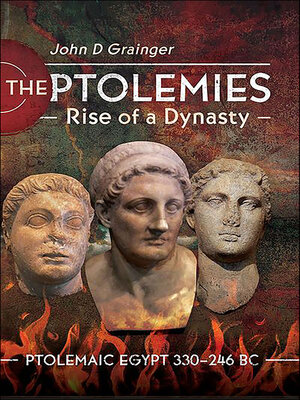
Sign up to save your library
With an OverDrive account, you can save your favorite libraries for at-a-glance information about availability. Find out more about OverDrive accounts.
Find this title in Libby, the library reading app by OverDrive.



Search for a digital library with this title
Title found at these libraries:
| Library Name | Distance |
|---|---|
| Loading... |
"Thoroughly 'reader friendly' in organization and presentation . . . an ideal introduction to the creation and rise of the Ptolemaic era of Egypt." —Midwest Book Review In this first volume of his trilogy on the Ptolemies, John Grainger explains how Ptolemy I established the dynasty's power in Egypt in the wake of Alexander the Great's death. Egypt had been independent for most of the fourth century BC, but was reconquered by the Persian Empire in the 340s. This is essential background for Ptolemaic history, since it meant that Alexander was welcomed as a liberator and, after the tyranny of Kleomenes, so was Ptolemy. This was the essential basis of Ptolemy's power. He conciliated the Egyptians, but reinforced his military strength with Greek settlers, mainly retired or available soldiers. He built the city of Alexandria, but to his own requirements, not those planned by Alexander. The empire outside Egypt was acquired, perhaps for defense, perhaps by sheer greed. Ptolemy took over Cyrenaica (with difficulty), Cyprus, and Syria/Palestine. These had to be defended against his rivals, hence the development of his navy, and the Syrian Wars. The succession was carefully managed, but not directly hereditary (Ptolemy II wasn't the eldest son), and the new king was very different. He fought repeated wars in Syria, built up his navy in the Aegean to the greatest seen in the ancient world, and extended his empire into the lands of the Red Sea, Sudan, and Ethiopia. He taxed the Egyptians mercilessly to fund all these activities. Yet few of his wars were successful, and he stored up trouble for his successors. This volume by a historian of the period delves into these events in a clear, compelling style.







